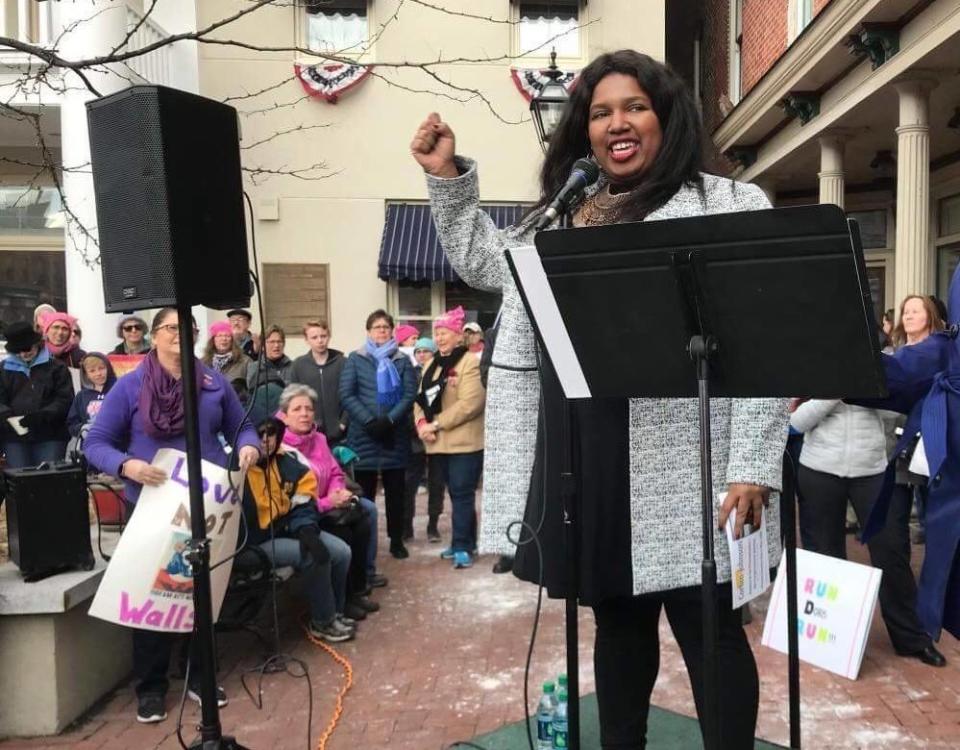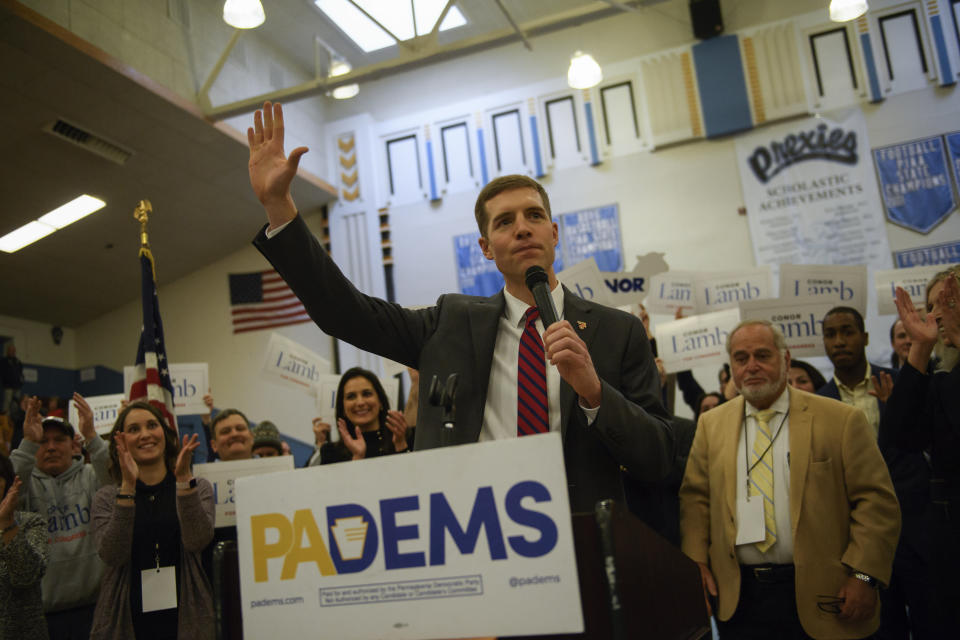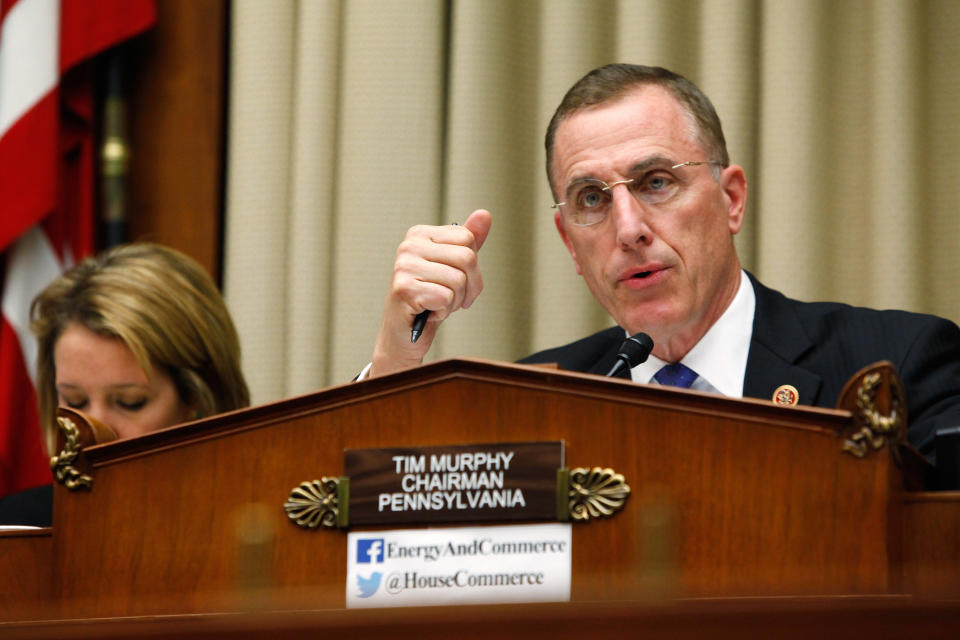Pennsylvania Redistricting Leads To Bad Blood Among Some Democrats Forced To Shuffle Electoral Plans
Democrats rejoiced last month when the Pennsylvania Supreme Court redrew the state’s congressional districts, ruling that the GOP had gerrymandered the map unconstitutionally. The court’s move made Democrats competitive in several more districts than they would have been under the Republican plan.
But it also transformed Pennsylvania’s 16th Congressional District from one where Democrats had a shot at winning to one that looks like it will stay solidly red. Democrat Christina Hartman, an establishment favorite running there, announced Wednesday that she would be withdrawing from that race and running in the adjacent 10th District instead.
Her move potentially sets up a fight between Hartman, a well-funded candidate with big endorsements, and several candidates who put in months of grunt work before the 10th District race became competitive enough to attract national attention.
One of the contenders is Shavonnia Corbin-Johnson, a 26-year-old African-American woman and former congressional aide who served in President Barack Obama’s administration as a budget adviser. Corbin-Johnson, a staunch progressive who has campaigned in relative obscurity for six months, has little campaign cash and few national endorsements to show for her efforts. But she has attracted a devoted cadre of grassroots volunteers.
“Her being a minority female has really inspired a lot of strong women,” said Torry Tyler-Bragg, a community activist of Native American descent who is based in York, Pennsylvania.

Before Hartman announced her decision this week, she called Corbin-Johnson.
The call rubbed Corbin-Johnson and her campaign the wrong way, illustrating a growing rift in Democratic primaries. On several occasions in this election cycle, local activists and the candidates they support have bristled at the machinations of well-funded candidates and their establishment backers.
In the call, Hartman noted that it would take enormous resources to unseat the incumbent, Rep. Scott Perry (R). She then assured Corbin-Johnson, who has struggled to raise funds, that she would be welcome “on her team” if Hartman wins the nomination.
Corbin-Johnson and her team interpreted Hartman’s call as, essentially, a proposal to Corbin-Johnson that if she dropped out, she could get a job on Hartman’s campaign.
Corbin-Johnson, who was born in York and raised there by foster parents, took umbrage at the notion that an outsider could swoop into the race and presume to have it locked up by virtue of her financial resources.
Hartman “wants a clean shot at the primary, and was hoping that she could patronize her way to victory,” said Ezra Kane-Salafia, a spokesman for Corbin-Johnson’s campaign.
The Democratic Congressional Campaign Committee has not endorsed Hartman, but her previous bid in the Lancaster-area district had the backing of virtually every prominent Pennsylvania Democrat, including former Gov. Ed Rendell. Hartman won those high-profile endorsements despite underperforming Hillary Clinton in the district in 2016 with similarly robust backing and financial resources.
For Collective PAC, a group that supports black political candidates, Hartman’s alleged conduct illustrates a tendency of Democratic leaders to resist diverse candidates based on outdated notions of general-election viability. The PAC has already taken the DCCC to task for thus far failing to endorse any black House candidates as part of its “Red to Blue” program targeting GOP-held districts.
“There are systemic and institutional challenges women of color face when running for Congress, and right now the Democratic establishment is not committed to addressing this inequity,” said Quentin James, a spokesman for Collective PAC.
The primary in Pennsylvania’s 10th is not the only contest where friction between establishment and insurgent Democrats has overlapped with a perception of insensitivity toward black candidates.
The Washington Post reported Friday that the DCCC met with local Democratic Party officials in Pennsylvania about encouraging progressive candidates to drop out of a race in an Allentown district that new borders have made more attainable for Democrats. One of those candidates, Greg Edwards, a progressive black pastor, told the Post he felt unfairly singled out for removal as the contest’s only candidate of color. The DCCC told the Post it had similar conversations about several candidates in Pennsylvania besides Edwards.
Hartman, for her part, says her call wasn’t meant to convey to Corbin-Johnson that she should leave the race.
“Christina meant to relay that should she become the nominee, she would work to earn Shavonnia’s support,” said Hartman campaign spokesman Mike Wilson. “Should Shavonnia become the nominee, Christina would work her heart out to ensure Shavonnia goes to Congress. That’s all.”
Hartman also says she made the call because she wanted to express gratitude to Corbin-Johnson for sharing voter data after the state Supreme Court ruling moved some of her voters into what was then Hartman’s district.
To Corbin-Johnson and her staff, though, Hartman’s appreciation doesn’t mitigate what Corbin-Johnson sees as the insulting nature of the call. For example, Hartman did not wish Corbin-Johnson luck or otherwise imply that the contest remains competitive, according to Kane-Salafia.
“When a new candidate from outside the district contacts Shavonnia on the day that she announces… insinuating that Christina is the presumptive winner or that Shavonnia should end her months-long campaign to join team Hartman, it is difficult to see how that is anything but directly disrespectful,” Kane-Salafia said.
While Hartman is not legally required to move to the 10th District in order to run there, her campaign said she plans to settle on a new home there in the coming days. Hartman has touted her support for women’s reproductive rights, immigrant rights and environmental “stewardship,” as well as improvements to the Affordable Care Act.
Corbin-Johnson is likely the most left-leaning candidate in the race, campaigning on adopting a compassionate, public health-based approach to the region’s opiate epidemic, enacting Medicare-for-all and combating income inequality.
George Scott, a former U.S. Army officer, is running on a more moderate platform. And Alan Howe, a retired career Air Force officer, promises to fight to end the war on drugs, which he regards as a “hopeless failure.”
On Wednesday, public health scientist Eric Ding also announced his entry in the race.
With the addition of previously excluded parts of Harrisburg, as well as Hershey and Carlisle, Pennsylvania’s 10th District is more favorable terrain for a Democrat than its predecessor, Pennsylvania’s 4th.
But it remains an uphill battle for the party, particularly against Perry, the three-term GOP incumbent. Donald Trump won in the old 4th District by 21 percentage points, but he would have won in the new 10th by 9 points, according to a New York Times analysis. And the district’s partisan voter index went from R+11 to R+6, according to the Cook Political Report, which compiles the figure to show how a district voted in the presidential election compared to the country as a whole.
This article has been updated with information about Edwards and the DCCC.
Also on HuffPost
Conor Lamb Nomination

Saccone Greets Trump

Tim Murphy




"I just wanted to let you know: Get in there and get him out. Cuss if you don't do it. I'm coming down myself," Skowvron said. "The way Trump talks to people, the way he's treating the world ... He's ruining the country," Skowvron added.

Trump performed well in the area because young people supported him, according to Nakoneczny. "They're tired of all these promises," he said. "Everybody's promising 'em, nobody's ever doing nothing."
Nakoneczny continued: "As much as Trump sucks, he's telling you, 'I'm putting yinz first. I'm doing what you wanna do.' But he's not doing it the right way, ya know what I mean?"

"I'm like, 'You know what: Let somebody in who's been in business that seems to know what he's doing because he's not broke," she recalled. But Dhanse has heard that the GOP tax legislation is "not gonna really do much for the middle class."
"The people that make a million dollars, they should be able to give a little more to make businesses give raises. People can't live on $7.25 an hour," Dhanse added. "And the minimum wage hasn't changed for how long? Thirteen years or something like that."
![Wes Donahoe, 29, is a medical equipment repair specialist in Jeannette, Pennsylvania. He voted for Libertarian Gary Johnson in the 2016 election and didn't know enough about the special election candidates to decide how he would vote. But he is pretty satisfied with President Donald Trump, including the tax cut bill, which he believes will help him and most people in the middle class. <br /><br />At the same time, Donahoe said the corporate tax cuts will probably not prompt companies to create new jobs. "Just because a company is getting more tax breaks doesn't mean that there's more demand for [their] production or service or anything," he said.](https://s.yimg.com/ny/api/res/1.2/q0FW05TcR9jG8482WFiJGw--/YXBwaWQ9aGlnaGxhbmRlcjt3PTk2MA--/https://img.huffingtonpost.com/asset/5a6237291e000028005add63.jpeg)
At the same time, Donahoe said the corporate tax cuts will probably not prompt companies to create new jobs. "Just because a company is getting more tax breaks doesn't mean that there's more demand for [their] production or service or anything," he said.

Lintz, a lifelong Democrat, voted for Barack Obama but left the top of the ballot blank in 2016. He said he would have rather voted for Mickey Mouse than either Hillary Clinton or Donald Trump. "I don't think there is a party for working people any more," he said. "They're all the same. Call it Republicats and it would be right now."
Hearing Lintz opine at the McDonald's in Burgettstown, Pennsylvania, Don Dowler, 72, walked over. Dowler, a retired union member, voted for Donald Trump in 2016 and is inclined to vote Republican in the special election. But if Dowler heard the Republican candidate is anti-labor, he said, "That might affect me, yeah. It depends which way he goes."
Love HuffPost? Become a founding member of HuffPost Plus today.
This article originally appeared on HuffPost.

